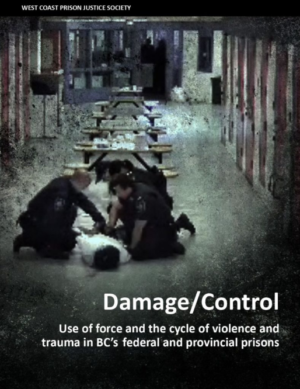Joey Toutsaint on CBC’s The Fifth Estate
Follow this link to see the Fifth Estate’s story about CSC’s continued use of solitary confinement on Joey Toutsaint, 12 years after the tragic death of Ashley Smith:

Follow this link to see the Fifth Estate’s story about CSC’s continued use of solitary confinement on Joey Toutsaint, 12 years after the tragic death of Ashley Smith:
Today, Prisoners’ Legal Services called on the governments of Canada and British Columbia to take immediate and dramatic action to address the crisis of the over-representation of Indigenous prisoners.
Click here to see our open letter to government.
We make this call to action with other leaders in the legal community, including the Canadian Prison Law Association, the Indigenous Bar Association, the Criminal Trial Lawyers Association, the Alberta Prison Justice Society.

Today, the West Coast Prison Justice Society and Prisoners’ Legal Services (“PLS”) released Damage/Control: Use of force and the cycle of violence and trauma in BC’s federal and provincial prisons. The report analyzes law and policy governing the use of force by correctional officers in light of interviews with over 100 federal and provincial prisoners and makes 87 recommendations for change.
The report highlights the stories of 21 people who were subjected to acts of force in the custody of BC Corrections or Correctional Service Canada (“CSC”), including federal prisoner Joey. Joey, who like many people in custody has a history of trauma, began self-harming in prison as a coping mechanism. Because of his self-harm, Joey has been pepper-sprayed and forcibly removed from his cell by the Emergency Response Team, a group of officers in riot gear with pepper spray and shields. He has been isolated in empty, filthy cells with the lights on 24 hours per day and officers sitting outside threatening to pepper spray him if he hurts himself. Joey says these experiences were so traumatic that now, when he worries the Emergency Response Team is coming, he often waits with a razor blade to his throat or a noose wrapped around his neck.
“Joey’s case exemplifies the psychological harm done to prisoners when officers repeatedly rely on force. Using force rather than a therapeutic response has done nothing to stop his self-harm and only exacerbates his distress and thoughts of suicide. This terrible cycle indicates how misguided, counterproductive, and dangerous it is to use a punitive response against traumatized and vulnerable prisoners,” said Nicole Kief, Joey’s PLS legal advocate and the report’s author.
The report finds that both CSC and BC Corrections officers use force in response to prisoners in emotional distress and as a tool to coerce compliance, even when there is no immediate risk to safety. It argues that relying on physical force in these circumstances creates an adversarial environment that compromises safety and wellbeing for both prisoners and staff.
“This report is designed to bring prisoners’ stories to the forefront and highlight the way even ‘justified’ uses of force can create environments of mistrust, trauma and fear,” said Ms. Kief. “Eliminating acts of force, as far as possible, is to the benefit of BC Corrections and CSC, as well as to the people in their custody.”
As part of PLS’s review, BC Corrections made internal materials available to PLS, including video footage and internal reports about many use of force incidents. “We commend BC Corrections for their commitment to transparency and accountability,” said Ms. Kief. “It is unfortunate CSC was not equally transparent.” The report calls for greater public accountability when officers use force, recommending the BC Investigation and Standards Office review every use of force against prisoners in BC Corrections custody. It also calls for prisoners’ voices to be heard in use of force reviews and for prisoners to have access to their personal information when force is used against them.
The report also examines the role of prison medical professionals, who check prisoners for injuries after officers use force. “We found that policies fail to ensure prison medical staff meet their ethical obligations to act with undivided loyalty to their patients and to document and report signs of ill-treatment,” said Jennifer Metcalfe, PLS’s Executive Director.
The report makes 87 recommendations for change, including:
• Using force only when necessary to prevent imminent harm to a person, and never to coerce compliance.
• Limiting Emergency Response Teams to emergencies involving imminent threats of serious physical harm, such as hostage takings or riots.
• Providing officers with in-depth training on working with people with mental health disabilities, particularly when they work at treatment centres, on mental health units, on segregation units, and as members of Emergency Response Teams.
• Creating specialized officer-nurse teams to respond jointly to situations involving emotional or medical distress, following police-health partnerships in the community.
• Developing and expanding mechanisms for prisoners with serious mental health needs, including those who chronically self-harm, to reside at community psychiatric facilities.
• Authorizing the Investigation and Standards Office to review every use of force in BC Corrections facilities.
To view the report, click here.
Media contacts:
Nicole Kief, Legal Advocate
604-636-0470
nkief@pls-bc.ca
Jennifer Metcalfe, Executive Director
604-636-0470
jmetcalfe@pls-bc.ca
Bill C-83 has undergone some amendments since we made our submissions to government in November, 2018. However, PLS is still concerned that the Bill does not take Canada’s use of isolation out of the United Nation’s definition of solitary confinement, and recent case law confirms that the Bill would not survive scrutiny under the Charter. The Bill is now before the Senate. You can read our submissions to the Senate committee reviewing Bill C-83 here.
The Correctional Service Canada classifies prisoners to higher security if they have a high “institutional adjustment” rating. Prisoners’ Legal Services is concerned that this factor is being applied in a discriminatory way against vulnerable groups, including Indigenous prisoners and those who suffer from mental disabilities. Click here to read our open letter to CSC Commissioner Anne Kelly.